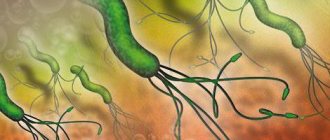No one likes to talk about their stool, but everyone should understand the important role poop plays in keeping the body healthy.
Intestinal motility is an important part of digestion, and waste excreted by the colon is the body's natural way of getting rid of waste and toxins.
Normal bowel movements are a balancing act between the need to forcefully push and the urgency to go to the toilet that you can barely contain yourself.
Most of us don't think about checking our stool in the toilet and immediately flush it. But if you care about your health, you should check it regularly, as the color, texture and consistency of your poop can give clues about your internal health.
The thing to look for is lasting changes, not temporary anomalies that last only a day or two.
Sustained changes that last a week or more can say a lot about your health.
Excrement in the form of hard lumps
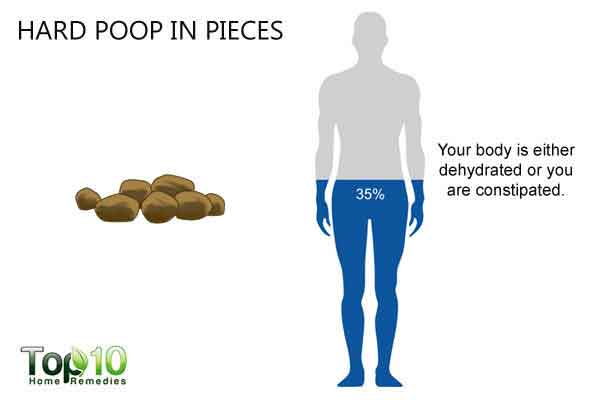
If you spend a lot of time on the toilet because your stool consists of small, hard, round or cylindrical clumps that are difficult to pass, your body may be either dehydrated or constipated.
Constipation is possible even with daily bowel movements, when your stool is constantly hard and comes out in chunks after strong straining, which can lead to hemorrhoids.
What to do in this case?
You can drink more water and eat foods high in both soluble and insoluble fiber .
Also, add magnesium-rich foods . Magnesium retains water in the intestines, making stool softer and easier to pass. It also relaxes the muscles in the intestinal walls, which also helps with constipation.
Strong smell of feces due to intestinal diseases
If a person feels well, but periodically notices that the excrement has a foul odor, it is necessary to examine the intestines to rule out diseases. First, you should take a stool test for helminths (including scraping for enterobiasis) and a coprogram. These studies will make it possible to determine the chemical composition of feces, detect signs of an inflammatory process and identify possible disorders in the digestive processes (for example, during inflammatory processes, an increased amount of detritus is detected in the feces).
After receiving the results of laboratory diagnostics, the doctor will make a preliminary diagnosis and prescribe additional examination, if there are indications for this. Secondary diagnostics may include hardware and instrumental methods, for example, colonoscopy, sigmoidoscopy, ultrasound or irrigoscopy. In some cases, a consultation and examination by a proctologist may be required to make an accurate diagnosis.
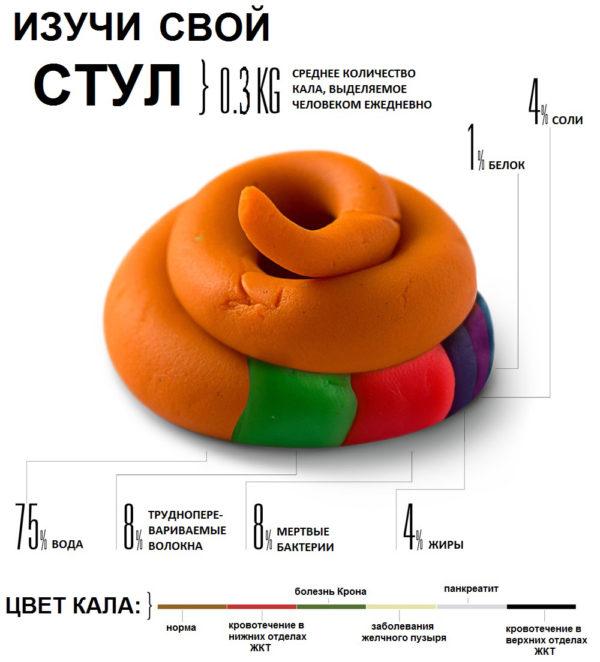
What does the color of stool mean?
The human intestine consists of two sections: the large and small intestine. The small intestine is located immediately after the stomach, and its inflammation is called enteritis. Inflammation of the epithelial lining of the large intestine is called colitis and occurs in every fourth patient with diseases of the digestive system. Foul-smelling feces in an adult are characteristic mainly of chronic colitis, since acute forms of the pathology occur with severe symptoms, and their clinical picture is similar to the symptoms of intestinal infections.
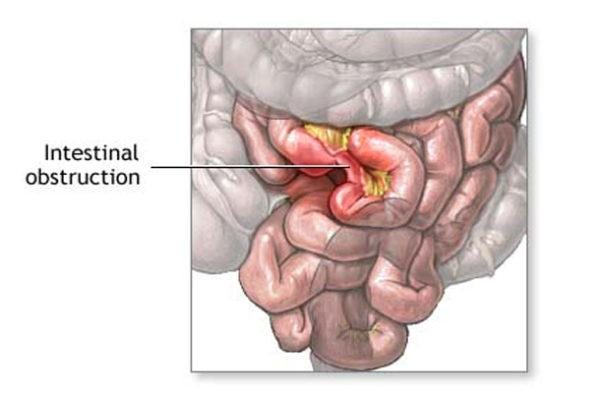
Chronic inflammation of the small or large intestine can occur for several reasons, including food and drug allergies, dietary errors, alcohol abuse, and smoking. Tumors in the intestines can also provoke an inflammatory process, so preventive endoscopic diagnosis is indicated for all people, regardless of their health, at least once a year.
Signs of chronic colitis or enteritis are:
- painful intestinal spasms accompanied by bloating and flatulence;
- bloating and pressure in the central or lower abdomen;
- nausea (rarely vomiting);
- unpleasant, pungent odor from excrement;
- bowel disorders.
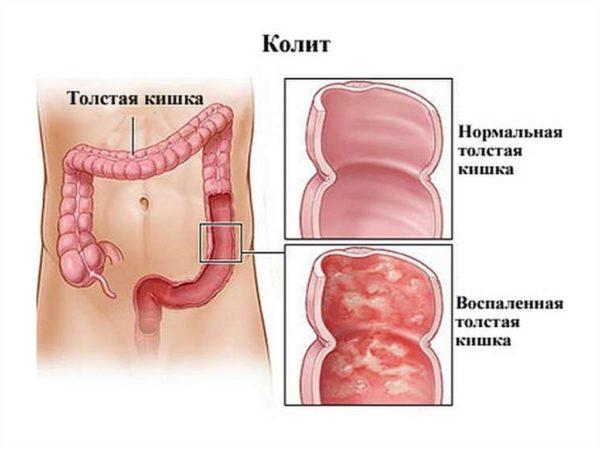
Intestinal condition with colitis

Methyluracil tablets
Important! If the inflammation occurs as a result of circulatory disorders in the intestinal vessels, the patient is additionally prescribed medications to prevent thrombosis (antiplatelet agents and anticoagulants).
Fungi of the genus Candida are opportunistic microorganisms, that is, they are normally present in the human microflora, but in small quantities, which does not allow the development of a fungal infection. If the body's protective functions are weakened, Candida begins to actively multiply and secrete toxins that cause acute intoxication and poison the intestines.
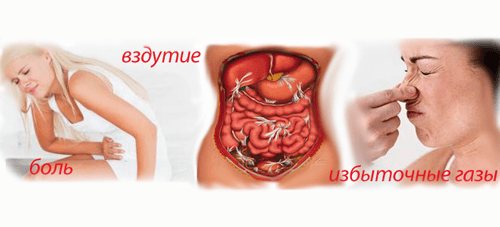
Symptoms of intestinal candidiasis
It is almost impossible to detect intestinal candidiasis without laboratory diagnostics, since there are usually no specific symptoms for this disease. The main manifestations of intestinal thrush are associated with changes in bowel movements and the appearance of stool. The patient may be bothered by frequent false urges to have a bowel movement, pain of varying intensity in the lower abdomen, and stool disorders. Feces with candidiasis become foul-smelling, it may contain white particles similar to cottage cheese, as well as a small amount of grayish mucus. Other symptoms of the disease include:
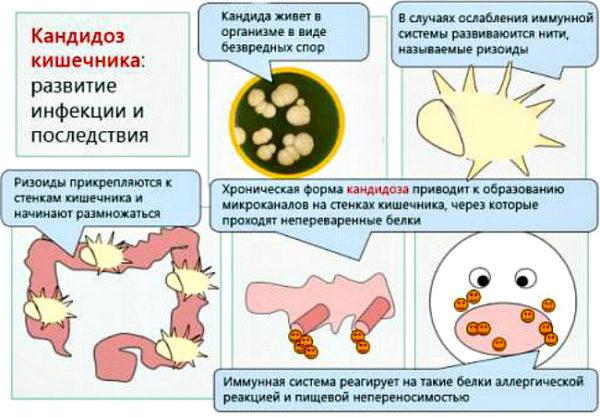
Development of intestinal candidiasis
Treatment of candidiasis is carried out with the help of antifungal drugs (in oral dosage form). Their list is given in the table below.
Antimycotics for the treatment of intestinal thrush in adults
To speed up the colonization of the intestinal mucous membranes with beneficial microflora and restore digestion, the use of prebiotics is indicated. During the period of treatment, you should limit your consumption of sugar, fatty foods, and foods that promote fermentation and decay.

Signs of worms
- foul odor from stool;
- stool disorders (constipation may often occur, suddenly followed by diarrhea);
- pale skin;
- flatulence, bloating, rumbling in the stomach;
- cramping pain in the lower abdomen;
- headache;
- reduction of the body’s general resistance (allergies, colds, etc.).
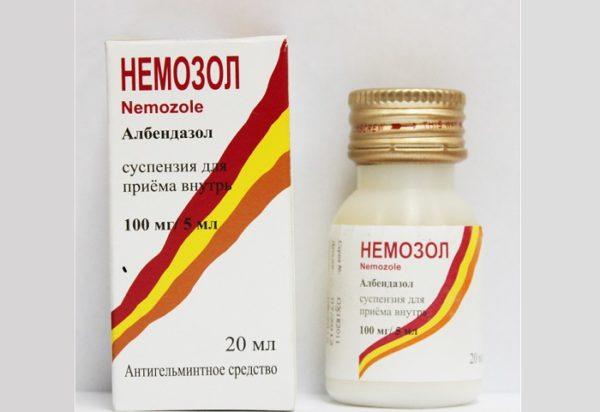
The drug Nemozol in the form of a suspension
If the foul odor does not go away for a long time, it is necessary to go to the hospital, since the consequence of improper or untimely treatment of certain intestinal pathologies may be the need for partial removal of the small or large intestine.
No one likes to talk about their stool, but everyone should understand the important role poop plays in keeping the body healthy.
Intestinal motility is an important part of digestion, and waste excreted by the colon is the body's natural way of getting rid of waste and toxins.
Normal bowel movements are a balancing act between the need to forcefully push and the urgency to go to the toilet that you can barely contain yourself.
Most of us don't think about checking our stool in the toilet and immediately flush it. But if you care about your health, you should check it regularly, as the color, texture and consistency of your poop can give clues about your internal health.
The thing to look for is lasting changes, not temporary anomalies that last only a day or two.
Sustained changes that last a week or more can say a lot about your health.
Black chair
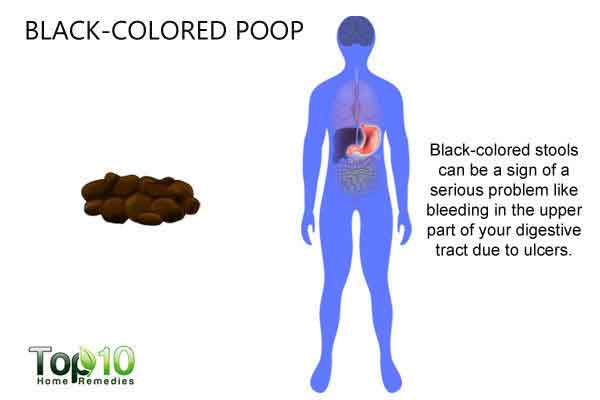
Newborn babies' stool is black in color for the first few days after birth, but soon changes to normal.
If an adult's poop is black, it may be caused by simply eating something black, such as something very dark (such as black licorice, blueberries), or taking a specific medicine or iron supplement. .
But if black poop appears consistently, it may be a sign of more serious problems, such as bleeding ulcers in the upper digestive tract or esophagus (from acid reflux), or non-cancerous or carcinogenic tumors .
In this case, you need to visit a doctor.
Diet for gas with a smelly odor
To prevent the foul smell of gas, a certain diet is necessary. You should exclude from your diet foods that contain:
- starch;
- fructose;
- pectins;
- sorbitol;
- raffinose.
Goose, pork, mushrooms and other foods that are difficult for the digestive tract lead to the formation of foul-smelling gases. They are not completely processed, the remains begin to rot. Some drinks, such as kvass and alcohol, can also give a gas stench. They significantly enhance fermentation. The following must be excluded from the menu:
- onion;
- grape;
- pears;
- radish;
- canned food;
- baked goods;
- apples;
- bread products;
- cereals (except rice);
- corn;
- pickles;
- legumes;
- sausage;
- cabbage;
- milk and products containing it;
- marinades.
Red or reddish-colored stool
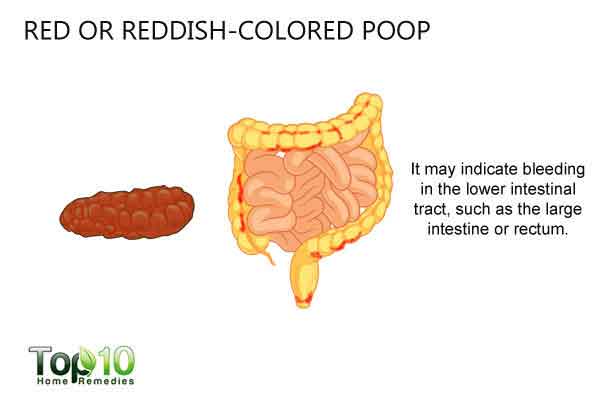
As with black stool, red or reddish poop is not normal and may indicate bleeding in the lower intestinal tract - the colon or rectum. Bleeding can be caused by both benign and cancerous tumors, inflammation in the colon (colitis), polyps in the colon, diverticulitis, and even hemorrhoids.
However, if you've only had reddish stool for a day or two, you don't have to worry, as the color could be due to foods that contain red food coloring or include beets, cranberries, tomato juice or soup, gelatin, or red-colored drinks .
Call your doctor immediately if you see red stool but you haven't eaten anything red.
Treatment
If the stench of feces appears against the background of dysbacteriosis, then the following drugs are used in therapy: “Bifidumbacterin”, “Lactofiltrum” and others.
Problems often appear due to an allergic reaction. Some of the most allergenic foods include honey, milk, citrus fruits, and chocolate. Along with a change in the smell of feces, a rash and peeling often appear on the skin. Flatulence, diarrhea and even chills can also be tormented. Food allergies can be cured in only one way - eliminating foods that trigger them from the diet.
Decepticcreep
In medicine, stool refers to the contents of the lower rectum, that is, feces. Feces are the end product of digestion. Waste biomaterial is removed from the body using the intestines through the anus. The sour smell of feces indicates the presence of fermentation and inflammation in the intestines.
Testing for intestinal diseases by smelling stool is increasingly being used around the world. British doctors have developed a whole system for identifying intestinal disorders based on the putrid odor of feces.
And there is nothing strange about this - pathogenic bacteria and microorganisms cause food to rot and release certain harmful toxins that contribute to the formation of an unpleasant odor in stool. A similar testing system was created based on a sensor for recognizing odors characteristic of certain ailments.
https://www.youtube.com/watch?v=v9lqUhyyMS0
Causes
The sour smell of feces is an alarming symptom. The reason may be hidden not only in digestive disorders.
The pathology is influenced by chronic intestinal diseases, the development of life-threatening infections - dysbiosis, impaired transportation of food masses, damage to the pancreas.
If the human body cannot adequately ensure the correct process of absorption of vital substances in the intestines, then a chronic illness develops. Poor absorption and very foul-smelling stool may be caused by:
- Food allergies;
- intestinal infections;
- celiac disease;
- food intolerance;
- Crohn's disease;
- inflammation.
With the above disorders, severe diarrhea (and it stinks), nausea, and insufficient absorption of beneficial components from food are observed. Foul stool is a sign of poor absorption and increased gas formation in the intestines. Similar bowel movements with vomiting occur during acute intestinal infections, when the normal bacterial flora of the digestive system is disrupted.
Why does stool have an unpleasant, pungent odor? The consistency and smell of stool is influenced by bacteria and microorganisms present in the intestines. With various violations, bacteria are activated and begin to multiply quickly. The growth of pathogenic microflora increases.
As a result, microbes poison the intestines more with their toxins and provoke increased rotting of food. Diarrhea with a sour smell indicates a chronic disorder of the digestive processes and intestinal infection.
Nasty and loose stools in an adult can occur due to pancreatic insufficiency.
Important! If the diarrhea has an odor, you should consult a doctor. Smelly diarrhea is often accompanied by abdominal pain, vomiting and nausea, flatulence, and fever. All of these conditions can be extremely dangerous.
Normally, a healthy person has bowel movements no more than twice a day. Feces have a soft consistency. Evacuation occurs effortlessly and without pain. The color of the stool is brown, and in infants it is light yellow. The smell of feces is normally unpleasant, but without fermentative or putrefactive tones.
What does feces smell like?
What determines the smell of feces? The answer is obvious - from the food taken the day before. Feces without an unpleasant odor are practically never found - certain foods provoke a corresponding “aroma” of feces.
When eating meat, there is a sharp-smelling poop; after eating dairy products or beer, a sour odor may occur. The stench appears when there is illness and the flow of bile into the intestines.
- A sour smell occurs if a person has consumed too much sugar, peas, legumes, or fruits. Foods rich in carbohydrates cause fermentation and dyspepsia.
- The stench develops with impaired pancreatic function and pancreatitis. Also, the stench occurs when there is hypersecretion of the intestines, if diarrhea occurs.
- A putrid smell is a sign of impaired digestion. Appears when proteins are poorly absorbed in the digestive system.
- Oily accents in the smell indicate the influence of bacteria and the decomposition of fats.
Treatment
In the process of therapy and correction of digestive disorders, it is necessary to adhere to a certain diet. Overeating, drinking alcohol, fatty meats, fried and spicy foods are extremely harmful to the body. In case of obvious violations, you should consult a doctor. For therapy, medications are prescribed to restore digestion.
If an infection is detected, treatment requires the use of an antibiotic. In case of poisoning, drugs that relieve intoxication are used. If no infection is detected, it is enough to follow a diet and take a vitamin complex.
On a note! Diarrhea in adults is treated with medications that harden the stool. Infection is indicated by strongly foul-smelling stools and frequent bowel movements. In some dangerous situations, hospital treatment may be necessary.
Prevention
To avoid various disorders in bowel movements and digestion, it is important to properly handle foods when preparing food.
Meat must be subjected to strong heat treatment. Do not cook meat and vegetables on the same cutting board. Vegetables may be contaminated with salmonella or other pathogenic flora. Bacterial infection of the intestines must not be allowed.
For various pathologies, obesity, and chronic illnesses, it is important to adjust your own diet. The menu should not contain food that causes fermentation in the intestines or irritates the walls of the stomach. These measures will significantly reduce the risk of complications.
Daily exercise and walks in the fresh air help improve health. Physical activity stabilizes the functioning of the digestive system and improves peristalsis of organs. The food entering the body is absorbed much faster.
All of the above measures contribute to the fact that the digestive organs will soon begin to work like a clock. The diet prevents the development of constipation and diarrhea, strengthens the immune system and ensures normal feces and bowel movements.
Causes Symptoms Treatment Prevention
What is it and why did it happen, what are the causes and symptoms of sour-smelling stool, how to treat sour-smelling stool, prevention and what to do if stool smells sour.
The smell of stool depends on the food previously eaten or health problems. Bacteria and microorganisms begin the process of rotting food and release harmful toxins that create odors.
Causes
The most common reason is food eaten early. Rare but serious causes: chronic intestinal disease, development of infection, disruption of food transportation, damage to the pancreas.
The appearance of foul-smelling stool can be caused by:
- food allergies;
- intestinal infection;
- celiac disease;
- food intolerance;
- Crohn's disease;
- inflammation.
The reasons above cause diarrhea and increased gas production, which smells sour. Vomiting may develop during acute intestinal infections.

Diarrhea with a sour smell indicates chronic indigestion and intestinal infection. Nasty and loose stools in an adult may occur due to insufficient pancreas.
It is normal to go to the toilet from three times a day to once every two days, the stool should look soft, and the process should be effortless and painless. In an adult, the color of the stool is brown, in infants it is light yellow, the smell is unpleasant, but without a fermentative odor and dark or other shades.
The appearance and smell of stool is affected by bacteria and microorganisms that are found in the intestines. With any disturbance in digestion, bacteria multiply faster, the growth of disturbed microflora increases and microbes poison the intestines with toxins, which provokes rapid rotting of food and an unpleasant odor.
The reasons are the same for everyone, but there are several differences between a child and an adult.
A sour smell in children may be due to an upset stomach. In babies and toddlers, this may be due to food allergies due to formula or mixed feeding, or in rare cases due to breastfeeding. In a child under 2 years of age, sour smelling stool may be accompanied by vomiting and fever due to rotavirus infection.
There are several diseases in children that are accompanied by a sour smell of stool:
- dysbacteriosis;
- fermentation dispersion;
- colitis;
- problems with the gastrointestinal tract.
It is impossible to diagnose the disease yourself, so consult a doctor.
A sour smell can occur when eating large amounts of plant foods. If you don't eat enough fiber, it will worsen your gut flora over time. The sour smell may be accompanied by diarrhea, flatulence, abdominal pain and bloating. It is worth seeing a doctor for a diagnosis.
Symptoms
Foul-smelling stool may be a sign of a serious illness. Call your doctor immediately if you experience the following symptoms:
- Blood in stool
- Black chair
- Pale stool
- Temperature above 39 degrees
- Abdominal pain
- Fast weight loss
- Chills
Treatment
If there is no infection in the body, then it is enough to follow a diet: do not overeat, do not drink alcohol and give up fatty and spicy foods.
Green color
Having green stool most likely means that you have consumed too many leafy green vegetables or foods that contain green food coloring, such as ice cream, ice cream, cakes, jellies, and so on. The green color of your stool may also be due to certain trace minerals present in dietary supplements you may have taken.
If you have green diarrhea, it means your food passed through your intestines too quickly and bile didn't have enough time to digest the fat that gives poop its normal brown color.
Note that a burst of green stool may indicate that you have infectious clostridial diarrhea caused by the bacteria Clostridium difficile (C. diff). It usually occurs after a course of antibiotics, which can kill the good bacteria that prevent C. diff bacteria from multiplying.
Sour-smelling stool in an adult
Everyone is familiar with the most common signs of diarrhea - frequent visits to the toilet, abdominal discomfort, often nausea or even vomiting, and an increase in temperature bring a lot of trouble.
These are not all the manifestations that await intestinal upset - often the stool acquires an unpleasant odor, indicating serious processes occurring in the body.
There are many causes of diarrhea with a sour smell, so before you begin treatment, you definitely need to understand them - this will help prevent complications and effectively cope with the problem.
The main causes of sour stool odor
The most common cause of sour-smelling diarrhea is the food you eat. Less commonly, liquid diarrhea may indicate intestinal diseases that require immediate treatment. Infection is another factor that causes stool disorders. Rare, but no less dangerous causes of foul-smelling diarrhea are also:
- inflammatory processes in the body;
- dysbacteriosis in infants;
- active consumption of plant foods;
- allergies provoked by internal and external irritants;
- negative reaction of the body to certain foods, medications, drinks;
- accumulation of toxins in the digestive organs;
- intestinal infection;
- insufficient secretion of secretions by the pancreas.
In infants, the stench of feces often indicates poor nutrition, poor absorption of nutrients, and the mother’s consumption of harmful foods.
Home treatment - the best recipes
If diarrhea with a sour smell does not indicate dangerous processes in the body and is a natural reaction to poor nutrition or allergens, you can cope with diarrhea on your own. It is not necessary to use pharmaceutical drugs - some home remedies can cope with loose, foul-smelling stools just as effectively.
Strong tea
One of the best folk remedies for foul-smelling diarrhea is concentrated black tea. Drink the drink with caution, especially for people with unstable blood pressure - the presence of caffeine in the composition will certainly provoke complications. Preparation:
- Boil water (200 ml).
- Brew tea granules or leaves (15 g).
- Leave for half an hour; to obtain a rich drink, wrap the container in a scarf.
- After filtering, add sugar (30 g) and mix.
Drink the product in one go. You are allowed to take liquid up to three times a day. It is allowed to alternate the use of the tea drink with other alternative medicines.
The main thing is not to take them at the same time. It is important to use only tea leaves for preparation without additives or flavorings.
Tea packaged in bags is also not suitable - it is recommended to brew a loose product.
Burnet decoction
Among the plants that actively influence attacks of diarrhea, burnet is quite popular. The inconspicuous herb also quickly copes with the main symptoms of loose stools - abdominal pain, nausea or vomiting, and fecal stench. Preparation:
- Bring water (240 ml) to a boil.
- Chop 25 gr. burnet (the rhizome of the plant is used).
- Brew the plant material, send it to a steam (water bath), and simmer for a quarter of an hour.
- Leave for 1 hour, filter.
It is not recommended to add any components to improve the taste (honey, sugar). Sweet ingredients will certainly reduce the effectiveness of burnet, and treatment will take much longer. Store the prepared broth in a cool place. Take 25 ml five times a day. Warm the product before each use.
Pepper, cinnamon
The use of spices will help stop even diarrhea with a strong sour smell. Use the product only for adults - in children, the use of spices can cause allergies or cause a burn to the mucous membranes. Preparation:
- Mix cinnamon powder (10 g.), crushed red pepper (10 g.).
- Brew spices with boiling water (150 ml).
- Leave to brew and strain.
Take homemade medicine at one time. It is recommended to use the spicy remedy only twice a day.
Usually, the next day, foul-smelling diarrhea decreases in intensity, but you should not refuse to use the infusion - for prevention, you should drink it for three days. Foul diarrhea is a problem that requires immediate solution.
We should not forget that diarrhea can indicate many diseases developing in the body, and not all of them are safe for health.
If, even after three days of home treatment, the alarming signs do not disappear, the stool exudes an unpleasant sour smell, be sure to visit a doctor. Only a doctor will determine what exactly caused loose stools and recommend medications and additional measures that will quickly cope with the problem.
All people without exception know what diarrhea and severe diarrhea are. This is loose stool, which differs from normal stools by being more frequent.
Diarrhea is a rather unpleasant phenomenon, since in addition to stool upset, it is often accompanied by painful sensations in the abdomen, nausea, vomiting and high body temperature.
However, that’s not all - in some cases, the patient’s stool with diarrhea has an extremely unpleasant sour or rotten odor. There are many reasons for the appearance of diarrhea with a very sharp and unpleasant odor, quite a lot, and an accurate diagnosis can be established with the help of a gastroenterologist.
articles:
Why does the smell of stool change with diarrhea, reasons?
The smell of stool during diarrhea can change under the influence of many factors, for example, eating unusual food or a violation of the motor-evacuatory function of the gastrointestinal tract. It has been established that refusal of animal foods and regular constipation lead to neutralization of the smell of feces.
If a person abuses alcohol or prefers protein foods in food, then the stool has a pronounced unpleasant odor. If the initial data remains unchanged for some time, but the stool during diarrhea still changes its smell, this may indicate various problems with the functioning of the internal organs.
Therefore, it is extremely important to note any changes in the smell and color of stool and understand their causes.
Differences in the smell of feces are most often caused by dysbiosis in the intestines and a deficiency of enzymes involved in the digestion process. Any of these factors can lead to the onset of putrefactive processes in the intestines, as a result of which the feces acquire an unpleasant odor of hydrogen sulfide.
If you eat foods rich in carbohydrates, especially coarse plant fiber in large quantities, a person may develop a syndrome such as fermentative dyspepsia. At the same time, a large amount of acids is formed in the intestines, which affects the smell of stool, making it sour.
The same condition can be caused by not chewing food thoroughly enough, as well as drinking large amounts of sweet carbonated drinks.
Source: https://shokomania.ru/kal-s-kislym-zapahom-u-vzroslogo/
Blood in stool
Bright red blood in your stool is something to take very seriously.
Visible blood in the stool is the main sign of rectal bleeding. This blood can be bright red, maroon, or even black.
However, streaks of blood on the outside of your stool may indicate that your hemorrhoid or rectal sphincter is torn due to constipation.
Other causes of blood in the stool may include a bleeding stomach ulcer, colitis, abnormal blood vessels, inflammation of the stomach lining, anal fissures, polyps, cancer, diverticulitis, inflammatory bowel disease, or an intestinal infection.
Whenever you notice blood in your stool, you should see a doctor to rule out the possibility of a serious health problem.
Strong smell of feces due to intestinal diseases
If a person feels well, but periodically notices that the excrement has a foul odor, it is necessary to examine the intestines to rule out diseases. First, you should take a stool test for helminths (including scraping for enterobiasis) and a coprogram. These studies will make it possible to determine the chemical composition of feces, detect signs of an inflammatory process and identify possible disorders in the digestive processes (for example, during inflammatory processes, an increased amount of detritus is detected in the feces).
After receiving the results of laboratory diagnostics, the doctor will make a preliminary diagnosis and prescribe additional examination, if there are indications for this. Secondary diagnostics may include hardware and instrumental methods, for example, colonoscopy, sigmoidoscopy, ultrasound or irrigoscopy. In some cases, a consultation and examination by a proctologist may be required to make an accurate diagnosis.
What does the color of stool mean?
The human intestine consists of two sections: the large and small intestine. The small intestine is located immediately after the stomach, and its inflammation is called enteritis. Inflammation of the epithelial lining of the large intestine is called colitis and occurs in every fourth patient with diseases of the digestive system. Foul-smelling feces in an adult are characteristic mainly of chronic colitis, since acute forms of the pathology occur with severe symptoms, and their clinical picture is similar to the symptoms of intestinal infections.
Chronic inflammation of the small or large intestine can occur for several reasons, including food and drug allergies, dietary errors, alcohol abuse, and smoking. Tumors in the intestines can also provoke an inflammatory process, so preventive endoscopic diagnosis is indicated for all people, regardless of their health, at least once a year.
Floating stool
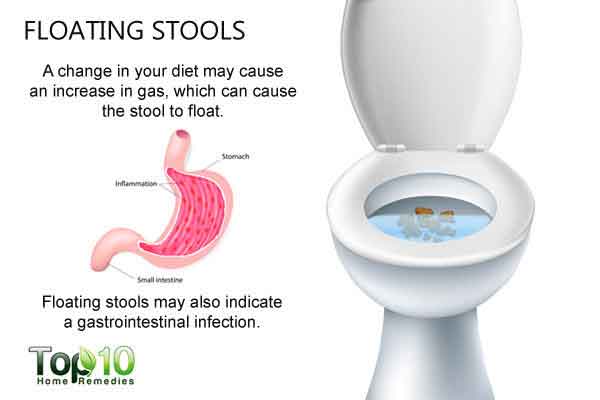
If you notice that your stool is floating in the toilet without sinking to the bottom, this could be due to several reasons.
Usually the floating stool is something you ate. Changes in diet may increase the amount of gas in the stool that causes buoyancy. Another common cause is poor absorption of nutrients (malabsorption). Floating stool may also indicate a gastrointestinal infection.
However, if floating stool becomes common, it may be due to inflammation of the pancreas.
which reduces the body's production of sufficient digestive enzymes. The cause of inflammation can be a food allergy or infection that can damage the inner lining of the intestines.
Most causes of floating stools go away without treatment, but if the problem persists, see your doctor.
Why do gases have a foul "aroma"?
Each of us will be able to distinguish the smell of shit from any other.
This is inherent in us at the genetic level. True, today people do not attach much importance to it. Modern man only strives to get rid of it by using air fresheners while he shits so that it doesn’t stink. But the smell of feces can carry a lot of valuable information for us. You yourself have probably noticed that it is not always the same and for each person it may differ in one direction or another. One person's shit stinks horribly, while another person's poop has a significantly lower concentration of pungent stench.
Also, the smell of feces differs not only in the strength of the stench, but also in other indicators; it may have sourness, rottenness or some other additional aroma in its palette of odors.
Thus, a change in the color, shape, consistency, as well as the smell of feces may indicate the presence of some kind of ailment that has settled in the human body or a disturbance in the functioning of a certain organ. Therefore, dear reader, do not underestimate feces and their smell. After all, not every medicine has a pleasant smell and taste, right?
INTERESTING FACT!!!
Did you know that our ancestors very actively used feces in their life. Using the color and smell of feces and urine, ancient people determined the health status of their neighbor, and thus, when an illness was discovered, they tried to attack him in order to take him by surprise and give themselves an advantage in battle.
Well, first of all, let's look at the question of why feces stink, where does its characteristic smell come from? To do this, we need to dive into the depths of our intestines and find out what kind of processes are happening there. After all, as we all know, feces are nothing more than digested food that we ate for lunch. But the fried potatoes and chops seemed to smell quite appetizing. What could have distorted their smell so much?
The fact is that when passing through the links of the digestive chain, food is broken down into simpler components and at each stage the breakdown of various types of substances contained in food products occurs.
The intestines are home to many different bacteria that are involved in the digestion process. During their life, gases are released. Which, in the process of forming feces, are mixed with poop making it porous.
Gases contained in the intestines are divided into 2 types: inert and caustic (so-called fecal gases, which actually stink).
Thanks to the formation of inert gases, we fart, and fecal gases give poop and farts, among other things, a corresponding fetid odor. The inert gas mixes with the fecal gas and fills the cavities in the feces and that's why shit stinks when we shit it.
Also, depending on the concentration of fecal gas, the intensity of the stench of poop can also affect the intensity of the stench.
It is worth noting that any poop stinks, but within normal limits. That is, healthy feces certainly have an unpleasant odor, but it should not be pungent. So to speak, the bias of stench aromas in one direction or another, of course, also depends on the type of food consumed.
Since this in turn affects the processes and nature of fermentation and rotting of digested food. So, for example, meat food gives a sharper smell, and dairy food, in turn, is sour. With constipation, a putrid odor appears as food stagnates in the intestines and begins to rot.
And with poor absorption of nutrients, they become food for pathogenic bacteria, which leads to their development and the appearance of a characteristic deviation in the smell of feces.
There are several types of shit stench:
- Sour - shit acquires a sour stench with excessive consumption of sugar, flour products, fruits, peas, etc., foods that are rich in carbohydrates, a large amount of which can cause fermentative dyspepsia.
- Foul odor of feces - quite often the cause of fecal stench is pancreatitis - a dysfunction of the pancreas. The cause may also be a lack of bile secretion, intestinal hypersecretion (increased mucus secretion).
- The putrid smell of shit - this type of aroma of feces is acquired when digestion in the stomach is impaired. It can occur with excessive consumption of protein foods, which are slowly digested and begin to rot.
- Oily smell of feces - occurs due to bacterial decomposition of fats.
To reduce the risk of diseases, the symptom of which is foul-smelling poop, it is enough to follow simple rules, and they consist of diet.
If the strong stench of shit is caused by a reaction to food, then you need to adjust your diet, your doctor will help you with this. Also follow the rules for preparing meat products and their placement on refrigerator shelves.
Do not cook meat and vegetables on the same cutting board, otherwise the vegetables may be contaminated with salmonella and other bacteria that lead to bacterial infections of the intestines.
Sometimes, foul-smelling stool can mean more than just a strong stench from your poop, but can be a diagnosis made by your doctor. Pay enough attention to your poop and its properties, including stench.
If you suddenly have a drastic change in the smell of feces and this continues for a long time, then perhaps this indicates a disturbance in the functioning of your body.
If other symptoms are added to the stench of feces, then this is a significant reason to consult a doctor to undergo examinations and, if necessary, receive timely treatment.
Kakasic is here, we hope we were able to provide you with a small portion of useful information about poop.
Relief!
Hydrogen sulfide gas, ammonia and aromatic carbohydrates (skatole, indole, mercaptan) give them an unpleasant stinking odor. Foul gases are formed due to excessive consumption of foods rich in proteins and sulfur.

Mercaptan is produced after the breakdown of methionine. Constant gases in the intestines with a foul odor also appear as a result of a number of diseases, mainly due to disruption of the gastrointestinal tract.
The intensity of the “aroma” depends on the percentage of certain substances in the bubbles. They are produced by a number of bacteria. Therefore, a number of foods are excluded from the diet:
- cabbage;
- meat;
- eggs;
- milk;
- soy;
- fish;
- cereals;
- any carbonated drinks.

The stench is mainly due to hydrogen sulfide, which has the smell of rotten eggs, methanethiol - rotten cabbage. A person’s nose can smell how hydrogen sulfide stinks even in small concentrations, so the sense of smell detects even a small or silent release of gases.
If the digestive process is slow and poor, then digestion of food is difficult. In this case, food begins to rot in the intestines, creating optimal conditions for the growth of pathogenic flora. Some microorganisms release hydrogen sulfide into the environment. This is what causes the sour stench.
The sour stench occurs as a result of fermentative dyspepsia. This can happen after eating peas, sweet flour dishes, kvass and some fruits. When the flow of bile is disrupted, feces acquire a foul odor. If you consume too much protein, your stool will have a putrid “aroma.”
What determines the smell of stool? Often unpleasant, foul-smelling stools occur with colitis, constipation and slow digestion of food in the gastrointestinal tract. If the digestive organs are attacked by harmful bacteria, the stool smells like rancid oil. Very often, a putrid aroma is accompanied by increased gas formation.
The norm is
- Unpleasant, but not pungent odor of feces;
- cylindrical stool;
- soft consistency of stool;
- brown color of feces;
- slight stool discharge.
Curdled, foamy or liquid stools indicate problems with the digestive system. Grayish-white feces indicate liver problems and the development of pancreatitis. Any change in the consistency of feces indicates problems in the intestines.
When a lot of dairy products predominate in food, they are poorly digested and give the stool a sour smell. If bacteria in the intestines produce hydrogen sulfide, the stool becomes rotten.
Stool smells like sulfur
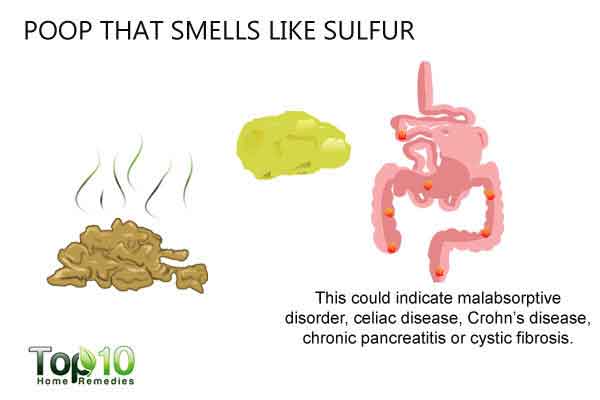
Unusual-smelling stool may indicate health problems such as malabsorptive disorder, celiac disease, Crohn's disease, chronic pancreatitis, or cystic fibrosis (CF).
If your stool smells like sulfur or rotten eggs and you have symptoms of diarrhea, it may indicate a stomach infection due to bacteria, viruses, or parasites.
Liquefied stool
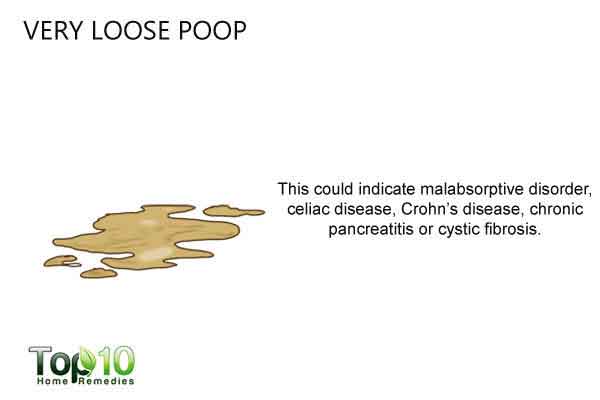
If your stools are very loose, but not as loose as diarrhea, you may have a gluten intolerance to grain products (celiac disease).
Those who suffer from celiac disease cannot tolerate gluten, the protein in wheat, rye and barley. Gluten helps loosen stools, which can occur several times a day. Switching to a gluten-free diet may solve this problem.
Sometimes, if your stool changes and becomes looser and the frequency of trips to the toilet increases, this may indicate hyperthyroidism ( overactive thyroid ), a condition in which the thyroid gland produces too much thyroid hormone.
If symptoms persist, be sure to consult a doctor.
Causes of foul odor
Feces are the result of the vital activity of the human body; unnecessary and waste substances are eliminated with it. The main role in the formation of the smell of feces is played by the microorganisms that inhabit the human intestines, and not by the food eaten the day before.
The main causes of unpleasant odor can be divided into two main categories: pathogenic and non-pathogenic.
- Predominance of protein foods in the diet. By decomposing and being processed, it is the nitrogenous bases that form the sharp, unpleasant odor of excrement.
- Liquefaction of stool. The softer the stool, the stronger and more pungent the smell. This happens due to the fact that in this case there is more moisture in the stool, which evaporates and gives this smell. During constipation, the stool is dense, the dry residue is much higher in percentage, and the smell of such excrement is less pronounced.
- Eating foods with strong odors. Foods such as fish, garlic, and onions can impart their odor to feces.
- Dysbacteriosis. Violation of the relationship between beneficial and opportunistic intestinal microflora leads to the predominance of the processes of rotting and fermentation over normal digestion of food. As a result, a sharp foul odor of feces and increased gas formation may occur.
- Infectious processes and helminthiases. During infection, the balance of microflora is disrupted and, as a result of inflammatory processes, the function of the cells of the mucous membrane of the gastrointestinal tube decreases. This leads to the appearance of a lot of undigested fiber, starch and other inclusions in the stool. In addition, the stool becomes significantly liquefied, fermentation processes are activated, flatulence is formed and the smell intensifies.
- Oncological pathology. Oncological diseases lead to disruption of digestion and loss of intestinal sections from the digestive processes. As a result, the processes of decay of undigested food fibers, which stagnate in the intestines, are activated.
- Melena. Gastrointestinal bleeding leads to the formation of strong, foul-smelling stools, which are the result of oxidation and fermentation of hemoglobin. While it has a tarry appearance, it is significantly liquefied.
- Liver diseases. Pathology of the liver parenchyma, gall bladder and ducts leads to insufficient bile formation and its release into the lumen of the gastrointestinal tube. As a result, digestion and intestinal motility are disrupted with the formation of putrefactive processes.
- Enzyme deficiency. Diseases of the pancreas and malabsorption syndrome lead to disturbances in the digestion of food with increased putrefactive processes.
- Irritable bowel syndrome. Functional pathology of the intestine, which results in disruption and separation of peristaltic waves. At the same time, the stool is unstable (either liquefied or constipated), the processes of fermentation and rotting intensify, and the feces become fetid.



